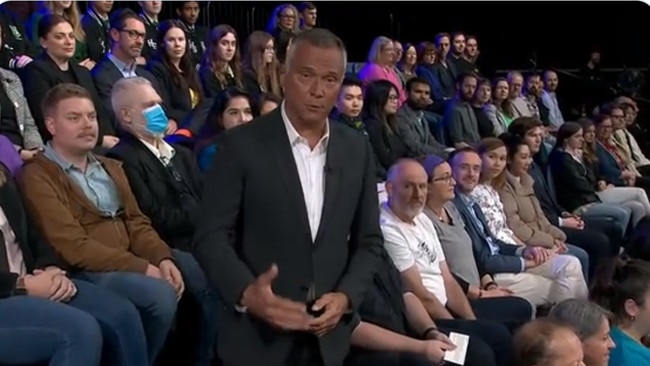Q+A host Stan Grant had to ‘fight’ ABC for debate about colonisation and republic
The host of the ABC’s flagship political chatfest ‘fought’ to ensure the issue was discussed during coverage of the Queen’s death.

Q+A host Stan Grant demanded robust discussions about colonisation and the possibility of Australia becoming a republic be aired on the program following the Queen’s death.
The Indigenous host, who fronts the national broadcaster’s flagship current affairs talk program, said he “fought” for a specific guest line-up on last week’s program, despite having initially “chosen respectfully to play no part in ABC’s coverage”.
At the start of Thursday’s show, Grant announced the panellists would be discussing, “colonisation, the republic, truth telling and is King Charles right for the role”.
Grant told The Australian on Sunday the Q+A program was the “first serious discussion on ABC-TV about colonisation, empire and republic since the Queen’s death”.
“I fought for that and to feature the important voices of black women Teela Reid and Sisonke Msimang,” he said. “Australia needed to hear that, it is always the right time to hear those voices.”
Grant said until that point he “had chosen respectfully to play no part in ABC’s coverage”.
On Sunday, the ABC’s website published a searing column by Grant in which he said he could not participate in the “ritual mourning” in the same manner as some of his journalistic colleagues.
“I have felt a sadness at feeling adrift, estranged from friends and colleagues. Sadness at knowing that at times like these there is a chasm between us,” Grant wrote.
“They come to this with no conflict. I cannot.”
Grant said that following the Queen’s death he had been “wrestling with swirling emotions”, including “anger”.
He also said he had been “short of breath and dizzy” after listening to Prime Minister Anthony Albanese publicly tell Australians that now wasn’t the time to discuss issues such as becoming a republic.
“We aren’t supposed to talk about colonisation, empire, violence about Aboriginal sovereignty, not even about the republic,” Grant said. “Writing this is not good for me. I feel my pulse racing now. I feel the tension building in my head. The veins constricting.”
The Q+A program included five panellists – Indigenous lawyer Reid, writer Msimang, The Ethics Centre’s executive director Simon Longstaff, American historian and author Ruth Ben-Ghiat and Australian Monarchist League’s campaign chairman Eric Abetz.
Abetz, a former Coalition senator, said it was frustrating he was the lone voice on the panel in support of the British monarchy.
“What I can’t understand is that the ABC didn’t have another constitutional monarchist or (someone like) Senator Jacinta Price, or Anthony Dillon, or Warren Mundine, to provide some balance that they so desperately needed,” he said.
Despite this, Abetz said he would appear on the program again if he was invited.
“My view is no matter what, if there’s an opportunity you’ve got to give an account for yourself even if you get bashed up,” he said. “The feedback I got was I gave a good account for the cause, albeit when you are one against four.”
Criticism of the ABC’s coverage of the Queen’s death and other news events was also voiced on ABC’s Radio National breakfast program last Thursday – host Patricia Karvelas told listeners the show was receiving plenty of negative feedback.
“Just to be very, very upfront, lots of criticism of the ABC’s coverage on our text line, we have absolutely tried to give you a range of stories including the very, very significant news of the Queen’s death which has implications across the world of course,” she said.
The ABC was contacted for comment but did not respond.




To join the conversation, please log in. Don't have an account? Register
Join the conversation, you are commenting as Logout